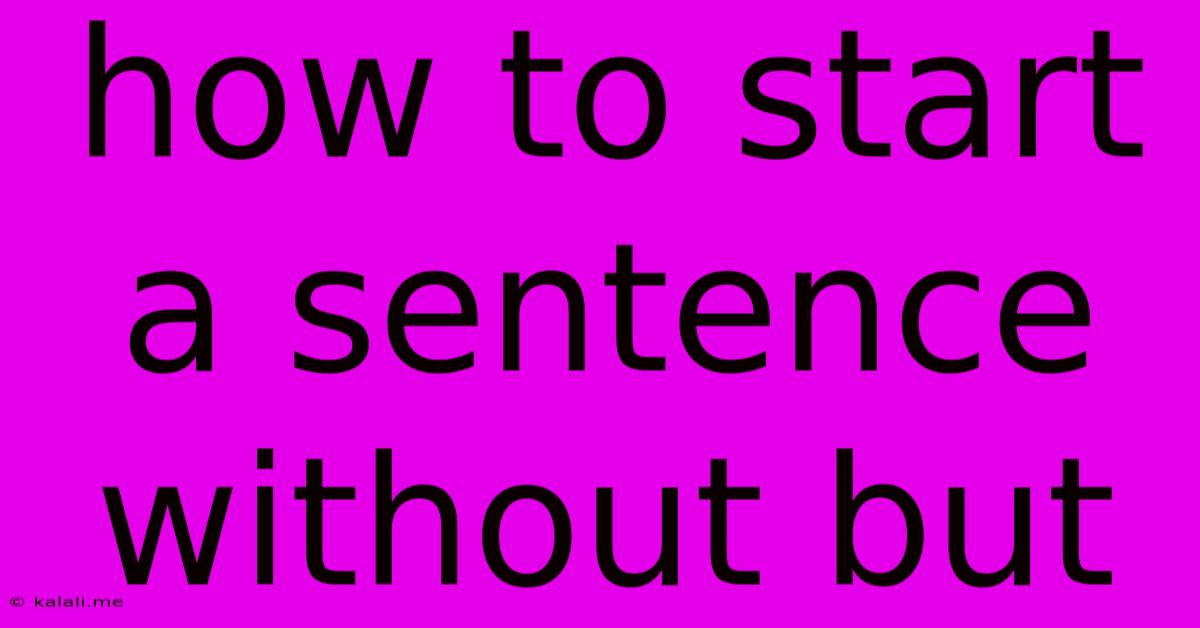How To Start A Sentence Without But
Kalali
May 25, 2025 · 3 min read

Table of Contents
How to Start a Sentence Without "But": Expanding Your Sentence Starters
Starting sentences with "but" is a common writing habit, but overusing it can make your writing feel repetitive and less sophisticated. This article provides effective alternatives to "but," boosting your writing's fluency and impact. Learn diverse sentence starters to enhance your prose and impress your readers.
Why Avoid Overusing "But"?
While "but" serves a purpose – indicating contrast or exception – excessive use creates a monotonous rhythm. It can weaken your arguments and make your writing feel clunky. Variety is key to engaging writing. Replacing "but" with stronger alternatives shows a wider vocabulary and improves your writing style, making your work more professional and polished.
Powerful Alternatives to "But"
Instead of relying on "but," explore these options, categorized for easier understanding and application:
Showing Contrast
-
Instead of: "The weather was beautiful, but the picnic was ruined."
-
Try: "Despite the beautiful weather, the picnic was ruined." or "The weather was beautiful; however, the picnic was ruined." or "Although the weather was beautiful, the picnic was ruined." or "The picnic was ruined, in spite of the beautiful weather."
-
Instead of: "He tried his best, but he failed."
-
Try: "Despite his best efforts, he failed." or "His best efforts notwithstanding, he failed." or "He failed, even though he tried his best." or "In spite of his best efforts, he failed."
-
Instead of: "She wanted to go, but she was too tired."
-
Try: "Her tiredness prevented her from going." or "Despite wanting to go, she was too tired." or "Although she wanted to go, she was too tired." or "She was too tired to go, even though she wanted to."
Showing Exception
-
Instead of: "Everyone loved the movie, but John thought it was boring."
-
Try: "Everyone loved the movie except John, who thought it was boring." or "With the exception of John, who found it boring, everyone loved the movie." or "John was the exception; he thought the movie was boring, unlike everyone else."
-
Instead of: "The cake was delicious, but a little too sweet."
-
Try: "The cake was delicious, although a little too sweet." or "The cake was delicious, save for its slightly excessive sweetness."
Adding a Qualification or Limitation
-
Instead of: "The house was cheap, but it needed a lot of work."
-
Try: "The house was cheap; however, it required extensive renovations." or "The cheap house needed considerable repairs." or "While cheap, the house needed significant work."
-
Instead of: "The job is well-paid, but the hours are long."
-
Try: "The job offers a high salary, but it demands long hours." or "Despite the high salary, the job requires long hours." or "Although the job is well-paid, the hours are long."
Emphasizing a Contrasting Idea
-
Instead of: "I wanted to help, but I couldn't."
-
Try: "I wanted to help; unfortunately, I couldn't." or "My desire to help was thwarted by my inability to do so." or "I was prevented from helping, despite my intention."
-
Instead of: "It was a good idea, but it didn't work."
-
Try: "The idea was sound, yet it proved ineffective." or "It was a good idea, nonetheless it failed." or "Despite its merit, the idea didn't work."
Improving Your Sentence Structure
Replacing "but" is just one step towards better writing. Focus on crafting varied and complex sentence structures. Experiment with different sentence lengths and types – simple, compound, and complex – to create a more dynamic and engaging reading experience.
By consciously avoiding over-reliance on "but" and utilizing these alternatives, you'll significantly enhance your writing style, making it more sophisticated, fluent, and ultimately, more impactful. Remember, strong writing is about clear communication and engaging your reader – and avoiding repetitive sentence structures is a key part of that process.
Latest Posts
Latest Posts
-
Work Out Your Own Salvation With Fear And Trembling
May 25, 2025
-
Freezer Is Working But Not Refrigerator
May 25, 2025
-
How To Say Father In Japanese
May 25, 2025
-
How To Say Are You Okay In Spanish
May 25, 2025
-
How Do You Cite A Movie In Mla
May 25, 2025
Related Post
Thank you for visiting our website which covers about How To Start A Sentence Without But . We hope the information provided has been useful to you. Feel free to contact us if you have any questions or need further assistance. See you next time and don't miss to bookmark.